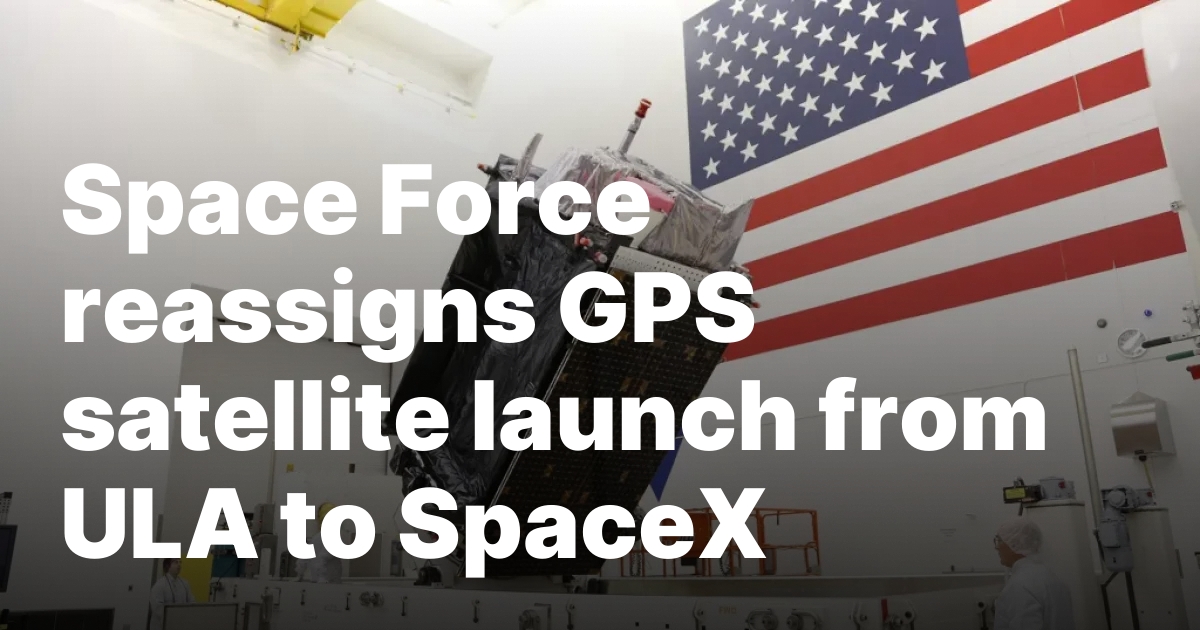Space Force Transfers GPS Satellite Launch to SpaceX to Alleviate Storage Backlog
The U.S. Space Force has recently made a strategic decision to transfer the responsibility for launching a GPS satellite from its traditional partner, United Launch Alliance (ULA), to the innovative aerospace company, SpaceX. This move aims to address the growing backlog of satellites that are currently in storage, awaiting launch.
The satellite in question is the GPS III SV-08, the eighth installment in the advanced GPS III constellation. It is now slated for a launch no earlier than late May, utilizing a SpaceX Falcon 9 rocket. The launch is scheduled to take place at the Cape Canaveral Space Force Station in Florida, as announced by the Space Systems Command on April 7.
This change in launch provider is not an isolated incident. It follows a similar decision made last year when the GPS III SV-07 satellite was shifted from a planned ULA Vulcan rocket launch in late 2025 to a SpaceX Falcon 9 launch. This mission, called Rapid Response Trailblazer, was successfully executed on December 16.
To maintain a balanced relationship with its launch service providers, the Space Force has committed to assigning a future GPS launch back to ULA. This is part of a strategy to honor contractual obligations and distribute launch opportunities equitably between the two companies. It is important to note that ULA’s Vulcan rocket, which has been recently certified for National Security Space Launch (NSSL) missions, has encountered development delays, contributing to a backlog of military launches under the NSSL Phase 2 contract awarded back in 2020.
Colonel Jim Horne, who serves as the senior materiel leader of launch execution at the Space Systems Command, elaborated on the SV-08 launch. He stated that this mission represents a trade-off of the GPS III-7 launch from Vulcan to a Falcon 9 rocket. Additionally, a subsequent GPS IIIF-1 mission will be reassigned from SpaceX’s Falcon Heavy to the Vulcan, demonstrating the Space Force’s ability to expedite launch schedules to three months, a significant reduction from the typical 24-month timeline.
Accelerating Launch Timelines
The recent reassignment of the GPS satellite launch underscores the Space Force’s capability to fast-track launch timelines under the NSSL program. This program is tasked with managing high-value military and intelligence satellite launches. The overarching aim is to validate that the planning cycles, which traditionally take up to two years, can be effectively compressed to just a few months.
For the SV-07 and upcoming SV-08 missions, both the Space Force and the satellite manufacturer, Lockheed Martin, had to modify the payload interface. This interface is the hardware that connects the spacecraft to the rocket. The modification was necessary to ensure compatibility with SpaceX’s Falcon 9 rocket in place of ULA’s Vulcan.
The accelerated mission involves a complex integration of efforts across various Space Force organizations. These efforts include retrieving a GPS III satellite from storage, speeding up its integration with a launch vehicle, and preparing it for launch within a condensed timeframe, as highlighted by the Space Systems Command.
Lockheed Martin announced on April 7 that the SV-08 spacecraft, which has been ready for launch since 2021, was transported to Florida on April 2 aboard a U.S. Air Force C-17 Globemaster III. The satellite will undergo final processing before its upcoming launch.
Advancements in GPS Technology
The GPS III satellites represent the latest generation of the United States’ global positioning system. These satellites provide enhanced accuracy, improved anti-jamming capabilities, and increased interoperability with international satellite navigation systems. The advancements in technology are set to significantly improve global positioning services, benefiting both military operations and civilian applications worldwide.
Broader Implications and Industry Reactions
The decision to switch launch providers has broader implications for the aerospace industry. It highlights the increasingly competitive nature of the sector, where companies like SpaceX are pushing the boundaries of what is possible with rapid innovation and cost-effective solutions. This competition is beneficial for government agencies like the Space Force, which can leverage these advancements to enhance their operational capabilities.
Industry experts have reacted positively to this development, noting that the flexibility demonstrated by the Space Force in its launch strategy is a step forward in addressing the challenges posed by satellite launch backlogs. By diversifying its launch providers and expediting its launch timelines, the Space Force is setting a precedent for efficient space operations.
In conclusion, the transfer of the GPS III SV-08 satellite launch from ULA to SpaceX marks a significant milestone in the evolution of satellite launch operations. It exemplifies the Space Force’s commitment to leveraging cutting-edge technology and innovative partnerships to achieve its mission objectives. As the space industry continues to evolve, such strategic decisions will play a crucial role in shaping the future of satellite deployment and space exploration.
For more Information, Refer to this article.


































![Good Lock Features: Discover the Top Favorites [Exploring Good Lock ②] Unveiling the Most Popular Good Lock Features](https://www.hawkdive.com/media/samsung-mobile-good-lock-home-up-3-most-popular-features_thumb728-218x150.gif)